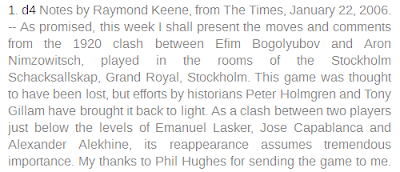...but in fact plagiarised from My Great Predecessors (UPDATE 13 January: the plagiarised annotations now seem to have been removed) are identical in almost every respect to those that appeared in the Spectator for 15 September 2007.
Now let's assume that Chessgames.com didn't know either of those two things, since they mention neither. This raises the question - how would they not know?
The only way they would not know, is if they didn't ask. If they, as it were, just took delivery of a huge consignment of annotated games, without asking where the notes came from.
Which would be a remarkable thing to do, would it not? I mean where Ray Keene is concerned?
But let's continue to make that assumption. Chessgames.com didn't know that the Botvinnik-Euwe notes were plagiarised, nor that they'd previously appeared in the Spectator. OK. Now the point is, this would have been avoided had Chessgames.com asked the question - are these notes original, and where did they first appear?
It's a question they should conceivably ask anybody contributing notes. But the last person in the entire world who they should decide not to ask, they apparently decided not to ask.
So as it stands, Chessgames.com are in possession of this huge archive of notes by Ray, some of which may be masquerading as notes by Ray when they are not, and some of which may be masquerading as original notes when they are not.
Now to be fair, some of the notes do give an original source. This one for instance.
It was in the Times in 2006. OK. But what about this one?
There's nothing in the Kasparov-Ivanchuk notes about the Spectator for 11 November 1995, where you can find the same notes in slightly longer form. (They've since been recycled again in the Sunday Times for 21 July 2013.) There should be, though, shouldn't there?
Or this? The notes to Keene-Stean advertise only that they were written by Ray
which they surely were. But presumably - since there is nothing to say otherwise - they were written specifically for Chessgames.com? Or perhaps some private publication of Ray's?
Not at all. Here's the British Chess Magazine for March 1974, pages 102 and 103.
As you can see, the BCM original
is apparently identical, save the omission of the note to White's twenty-third and the change from descriptive to algebraic, to the version on Chessgames.com.
Which is kind of important, because looking at the masthead to that BCM
it was kind of copyright and all
so failing to mention the original source really isn't the sort of thing one ought to be doing.
Now you may or may not believe me when I say that I haven't trailed through all 405 of those games to find some examples for this column. They were taken pretty much at random. I don't know precisely what is, or is not, in the Chessgames.com Ray Keene archive. I don't know what's not there that ought to be. I don't know what's there that ought not to be.
But do they? Because they ought to.
Because not knowing - and not asking - is when you end up publishing plagiarised and pilfered material.
So here's a friendly suggestion for Chessgames.com. Clean up Ray Keene's act for him. Ask Ray where all his notes are actually from, and whether they are all actually his. As a matter of urgency, make sure everything is properly attributed to its original source and its actual author.
Not because I say so, but because of what happens when you don't. And because it's actually your editorial responsibility to do this. And because you surely know this.
After all, you know what he is by now. Everybody knows what he is by now. So if you play host to him, without doing what you know you ought to do, then you're complicit in what he does.
There's been far too much complicity for far too long. It should surely stop.
[Ray copies Ray index]
[Ray Keene index]











3 comments:
Science, like wine, enjoys an appellation or two, eg degrees Kelvin, Fahrenheit et al.
Perhaps we need a new measure of plagiarism: modesty suggests it be a "Keene", that being defined as a standard unit of plagiarism to whit an exact copy of, say, a paragraph.
More extensive copying could be named a decaKeene, kiloKeene or, shudder, megaKeene.
Henceforth articles could simply be noted as "semiKeene", "tripleKeene" etc as the case may be.
At the end of each chess year we could have our very own award ceremony, the "Penguins" to rival the Oscars.
Well he's usually dressed for it.
Indeed!
Some of us remember the portly figure of Mr Keene touring Oz as the monkey for an organ-grinder, one Lucena. The pair were running mates for FIDE presidency once upon a time.
See this link for more of the farce:
http://www.chesshistory.com/winter/extra/relief.html
Mr Keene's trip had one side benefit: his behaviour inadvertently left behind a wonderful batch of hilarious after dinner stories which chess players still regale themselves with decades later.
Post a Comment